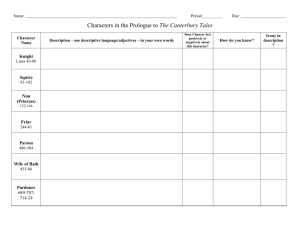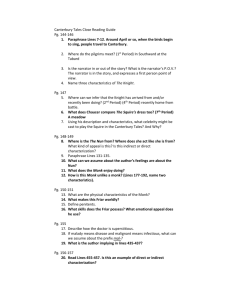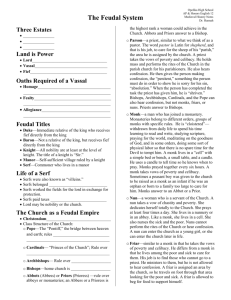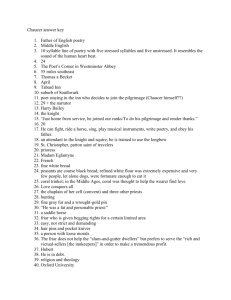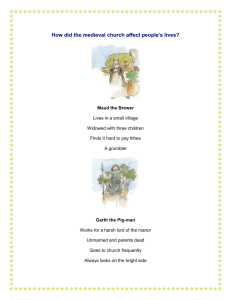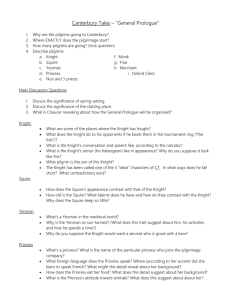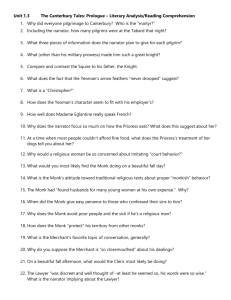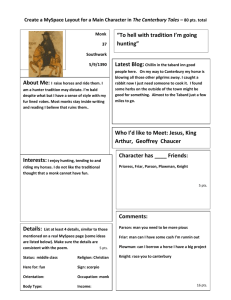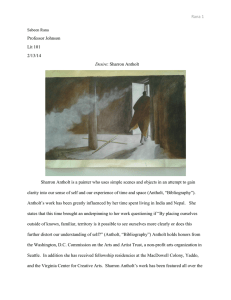English 11cp Hilston, Pinzone, Duffy Topic: The Canterbury Tales
advertisement
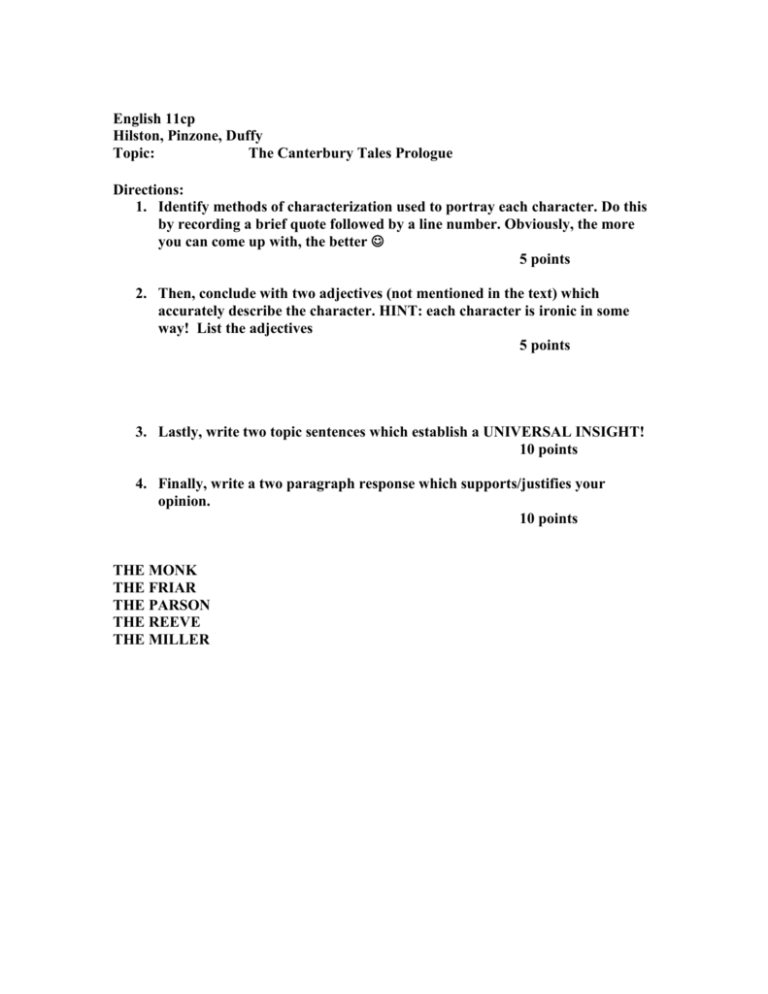
English 11cp Hilston, Pinzone, Duffy Topic: The Canterbury Tales Prologue Directions: 1. Identify methods of characterization used to portray each character. Do this by recording a brief quote followed by a line number. Obviously, the more you can come up with, the better 5 points 2. Then, conclude with two adjectives (not mentioned in the text) which accurately describe the character. HINT: each character is ironic in some way! List the adjectives 5 points 3. Lastly, write two topic sentences which establish a UNIVERSAL INSIGHT! 10 points 4. Finally, write a two paragraph response which supports/justifies your opinion. 10 points THE MONK THE FRIAR THE PARSON THE REEVE THE MILLER THE MONK A monk there was, one made for mastery, An outrider, who loved his venery; A manly man, to be an abbot able. Full many a blooded horse had he in stable: And when he rode men might his bridle hear A-jingling in the whistling wind as clear, Aye, and as loud as does the chapel bell Where this brave monk was of the cell. The rule of Maurus or Saint Benedict, By reason it was old and somewhat strict, This said monk let such old things slowly pace And followed new-world manners in their place. He cared not for that text a clean-plucked hen Which holds that hunters are not holy men; Nor that a monk, when he is cloisterless, Is like unto a fish that's waterless; That is to say, a monk out of his cloister. But this same text he held not worth an oyster; And I said his opinion was right good. What? Should he study as a madman would Upon a book in cloister cell? Or yet Go labour with his hands and swink and sweat, As Austin bids? How shall the world be served? Let Austin have his toil to him reserved. Therefore he was a rider day and night; Greyhounds he had, as swift as bird in flight. Since riding and the hunting of the hare Were all his love, for no cost would he spare. I saw his sleeves were purfled at the hand With fur of grey, the finest in the land; Also, to fasten hood beneath his chin, He had of good wrought gold a curious pin: A love-knot in the larger end there was. His head was bald and shone like any glass, And smooth as one anointed was his face. Fat was this lord, he stood in goodly case. His bulging eyes he rolled about, and hot They gleamed and red, like fire beneath a pot; His boots were soft; his horse of great estate. Now certainly he was a fine prelate: He was not pale as some poor wasted ghost. A fat swan loved he best of any roast. His palfrey was as brown as is a berry. THE FRIAR A friar there was, a wanton and a merry, A limiter, a very festive man. In all the Orders Four is none that can Equal his gossip and his fair language. He had arranged full many a marriage Of women young, and this at his own cost. Unto his order he was a noble post. Well liked by all and intimate was he With franklins everywhere in his country, And with the worthy women of the town: For at confessing he'd more power in gown (As he himself said) than it good curate, For of his order he was licentiate. He heard confession gently, it was said, Gently absolved too, leaving naught of dread. He was an easy man to give penance When knowing he should gain a good pittance; For to a begging friar, money given Is sign that any man has been well shriven. For if one gave (he dared to boast of this), He took the man's repentance not amiss. For many a man there is so hard of heart He cannot weep however pains may smart. Therefore, instead of weeping and of prayer, Men should give silver to poor friars all bare. His tippet was stuck always full of knives And pins, to give to young and pleasing wives. And certainly he kept a merry note: Well could he sing and play upon the rote. At balladry he bore the prize away. His throat was white as lily of the May; Yet strong he was as ever champion. In towns he knew the taverns, every one, And every good host and each barmaid tooBetter than begging lepers, these he knew. For unto no such solid man as he Accorded it, as far as he could see, To have sick lepers for acquaintances. There is no honest advantageousness In dealing with such poverty-stricken curs; It's with the rich and with big victuallers. And so, wherever profit might arise, Courteous he was and humble in men's eyes. There was no other man so virtuous. He was the finest beggar of his house; A certain district being farmed to him, None of his brethren dared approach its rim; For though a widow had no shoes to show, So pleasant was his In principio, He always got a farthing ere he went. He lived by pickings, it is evident. And he could romp as well as any whelp. On love days could he be of mickle help. For there he was not like a cloisterer, With threadbare cope as is the poor scholar, But he was like a lord or like a pope. Of double worsted was his semi-cope, That rounded like a bell, as you may guess. He lisped a little, out of wantonness, To make his English soft upon his tongue; And in his harping, after he had sung, His two eyes twinkled in his head as bright As do the stars within the frosty night. This worthy limiter was named Hubert. THE PARDONER With him there rode a gentle pardoner Of Rouncival, his friend and his compeer; Straight from the court of Rome had journeyed he. Loudly he sang "Come hither, love, to me," The summoner joining with a burden round; Was never horn of half so great a sound. This pardoner had hair as yellow as wax, But lank it hung as does a strike of flax; In wisps hung down such locks as he'd on head, And with them he his shoulders overspread; But thin they dropped, and stringy, one by one. But as to hood, for sport of it, he'd none, Though it was packed in wallet all the while. It seemed to him he went in latest style, Dishevelled, save for cap, his head all bare. As shiny eyes he had as has a hare. He had a fine veronica sewed to cap. His wallet lay before him in his lap, Stuffed full of pardons brought from Rome all hot. A voice he had that bleated like a goat. No beard had he, nor ever should he have, For smooth his face as he'd just had a shave; I think he was a gelding or a mare. But in his craft, from Berwick unto Ware, Was no such pardoner in any place. For in his bag he had a pillowcase The which, he said, was Our True Lady's veil: He said he had a piece of the very sail That good Saint Peter had, what time he went Upon the sea, till Jesus changed his bent. He had a latten cross set full of stones, And in a bottle had he some pig's bones. But with these relics, when he came upon Some simple parson, then this paragon In that one day more money stood to gain Than the poor dupe in two months could attain. And thus, with flattery and suchlike japes, He made the parson and the rest his apes. But yet, to tell the whole truth at the last, He was, in church, a fine ecclesiast. Well could he read a lesson or a story, But best of all he sang an offertory; For well he knew that when that song was sung, Then might he preach, and all with polished tongue. To win some silver, as he right well could; Therefore he sang so merrily and so loud.
